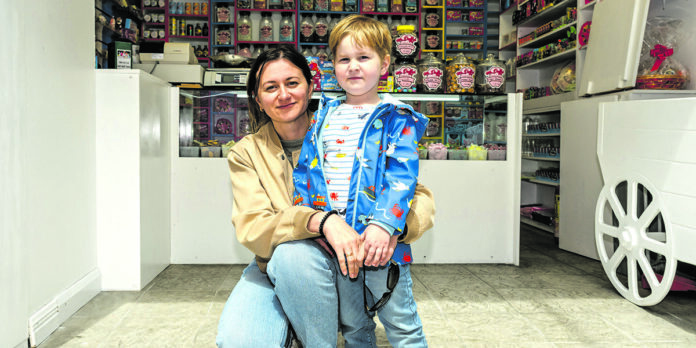ALREADY driven out of their homes and in many cases bereaved due to Russian barbarity, Ukrainian refugees at Phoenix House in Shannon were given just a fortnight’s notice that they would be relocated to Lisdoonvarna.
For many of working age it will mean the loss of their jobs as very few of the Ukrainian community there have their own cars. For elderly people it will mean having to get public transport from Lisdoonvarna to Limerick for medical appointments, with the process to be negotiated through a language barrier. For children it means more instability, after already having fled their homes and been through the trauma of witnessing the horror of war up close.
On last Friday afternoon, many of the Ukrainians who have to leave Phoenix House spoke to the Clare Champion about having to start over again.
Most of those we spoke to were from cities that have become familiar to Irish people from the Russian barbarity of the last two years, places such as Kharkiv, Mariupol and Odesa.
The vast majority of those living in the Shannon facility are either working, going to school or elderly.
Contrary to popular belief, they do make a contribution to the cost of their accommodation, although it is subsidised and below market rate.
Most of them said they have been looking for accommodation for months, but that it has been very difficult with the country as a whole in the grip of a severe housing crisis.
It was an extremely emotional afternoon, as the Ukrainians wept as they recalled the Russian violence, which swept them from their homes.
Anatoliy Novikov is a 76 year old man from the Kharkiv Oblast in the east of the country.
The Russians took control of his home place early on in the conflict, and he fled, undertaking a difficult and dangerous journey to freedom. “I was living under occupation for about three months. I had to walk about 63 kilometers, and went past eight checkpoints of the Russian army. I was shot at twice,” he recalls.
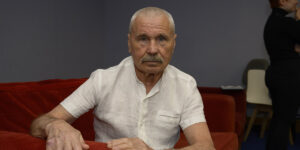
Photography by Eugene McCafferty
At Russian checkpoints they searched him for tattoos or other symbols of Ukrainian support, but eventually he made it to safety.
However his suffering wasn’t over, and he has suffered bad health since. “Here in Shannon, I had to get ambulances twice, I had two strokes and my arm doesn’t function that well now. Nearly every week I have to go to the hospital.”
Getting from Lisdoonvarna to Limerick for medical appointments may not be too daunting for an Irish person, but almost all the Ukrainians living in Phoenix House don’t have their own cars and don’t have a network of friends or relatives who have transport.
In his circumstances, Anatoliy is concerned about making his medical appointments using public transport from North Clare. “I don’t know how I will be able to live there.”
Also in his seventies is Eduard Verkhovetskye, who has been in Shannon for seven months. He also has poor health. “I am getting treatment in Limerick and I can barely walk to the bus stop. I have to do blood tests and I have an elevated risk of cancer, I’m preparing for an operation too.”
A few years ago he couldn’t have thought he’d end up seeking refuge in Ireland. “No, never. Putin is a f**king scumbag.”
He had friends who were killed during the Russian attack.
Tetiana Alymova came to Shannon with her husband and two sons, fleeing Mariupol.
“At this moment it is occupation territory. We had two terrible months there, we didn’t have water, we couldn’t get medicine, we didn’t have power, it was terrible. We were living in a cellar, it was very cold,” she says.
She has loved ones still living under Russian occupation. “Our parents are in the occupied territory right now. For two years now they have no running water and no electricity.”
Contact is occasionally possible if they leave Mariupol and are able to get a phone connection in another city.
Her sons are going to St John’s National School and the Toddle Inn Creche. She is worried about the impact of another move on them, while she also says it will likely make her unemployed. “We are very upset. It’s very difficult to leave another place. My children have new friends here. It’s terrible to have to change to another place. I have a job here, I won’t have one in Lisdoonvarna.”
When he met the Clare Champion Petro Volovenko (72) had to remain standing because of issues with his back and there are other medical issues. “As well as the back, a few years ago I had an issue with the prostate, so I’d be really grateful if I could get accommodation in Limerick or near any big medical centre,” he says.
From Kyiv, he has loved ones taking on Putin’s forces. “I have friends and relatives fighting in the war. It was really scary being there with the drone and missile attack. All the hospitals in Ukraine are full. Being in Ireland is the only way to feel a bit better.
“One of my nephews got injured, another one is missing. My friends are still fighting.”
He is thankful for the help Ireland has given him. “I’m very grateful for the treatment I’ve got here, and to the Irish people in general. I’m just very grateful.”
Andrii Bober is very disappointed that there was only two week’s notice of the move. “I am here since October last year, my wife is here since 2022. We are from an occupied area, there are five Russian soldiers living in my house. My son is studying in Poland, he came to us last summer and he got Temporary Protection. He left Ireland for education but now he can’t live here (in Phoenix House). We have had to rent accommodation for him in Shannon. My wife is learning English and I’m working in Zimmer Biomet for the last year and a half, I support my family, especially my son, because he’s just 17. We have rented accommodation for him here for the summer, after that he will go back. Now, we have got two weeks to find accommodation, our son will have to stay here, we can’t take him to Lisdoonvarna.”
In his opinion two weeks is not enough notice. “I’ve been looking for a house, but two weeks isn’t much time. We needed the information earlier, maybe two months, so we could rent accommodation. Two weeks is crazy. Right now on daft.ie there is only one house in Shannon and four or five rooms to share, that’s all. It’s impossible.
“If you lived in a house for six months I think you get one month’s notice, that’s a rule from the Government. Here it’s two weeks and I could lose my job. It’s the same for most people here, many people will lose their jobs.”
Mykhailo Lazarieva wasn’t present, but left a written message with his mother to pass on, expressing concern about the impact on his daughters, who have already been through huge trauma. “We will lose everything we got with hard work over the last two years. I have already lost everything once, my job, my house, my friends, my family, people close to me. My daughters have seen war with their own eyes. I don’t know how my older daughter will be able to lose her friends again. They both have mental health conditions, they are on antidepressants and other things. We can’t lose our jobs, it’s the only thing we have and I think we’re not the only ones.”

Photography by Eugene McCafferty
Oleksandra Hobzhelianova, better known as Sasha, would be a familiar figure to many people in Shannon through her job at Eason in the middle of the Town Centre.
She had the difficult task of interpreting many of the devastating stories shared by the residents last Friday, and it was an undeniably difficult experience for a woman who has lost so much since the Russian invasion.
Prior to that she worked in a bookshop in Odesa, and has been glad to continue in the same line of work in Shannon.
She became emotional when she spoke about the imminent loss of her job. “Staying at work is…It’s an opportunity to get out of bed, to see people, to talk to people every day. It’s the thing that keeps me sane, the thing that keeps me going. It’s the big part of my life right now and to lose that… Obviously I could start in a new place but I don’t think I can get a job in Lisdoonvarna, with all the Ukrainians already there. With my English it wouldn’t be hard to find a job in a shop or cafe in a town, but there won’t be an opportunity there.”
She said the fact she hasn’t already moved out of Phoenix House isn’t due to lack of effort. “I’ve been trying my best to find a place over the last year. All my friends tried too, most of them actually moved to Limerick, I’m the only one of my friend group left here. Basically this move will take my job, bring me away from where all my friends are. I’ll have nothing again.”
The closure of Phoenix House will put people on the dole and move another cohort of Ukrainians to an area that has already taken in a huge number. “The Irish people in Lisdoonvarna aren’t happy with the move at all. They are already overwhelmed with the people staying there. One of my friends from work, one of her friends’ mother works in the school and she said there are no places for people already there. I fail to see how it would be good for anyone, for us, or for them, or for the Government to lose so many people who are employed, to have them back on social welfare because there will be no other choice. We don’t see how it’s good for anyone involved for us to move to Lisdoonvarna.”
Natalia Rastiehaieva is in Shannon with her seven year old son Yehor, whose father is back in Ukraine, fighting against the Russians.
As well as being proud of him, she is also very worried about the danger he faces.
The sudden move to Lisdoonvarna is another worry for her, as she feels it could set back her son’s progress and she her become unemployed. “I don’t want to move, I’m working here, my son is in school, he is making progress and making friends. To move to a totally new place and start everything from scratch would be very hard. It’d be better for him to be here.”
Yana Mushtai came to Shannon with her young daughter, while her husband is missing, due to the war.
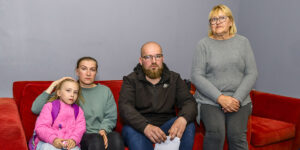
Photography by Eugene McCafferty
It has been an incredibly difficult couple of years since they left their native Mariupol and she is concerned that her daughter will be set back once more. “The first move here to Shannon was really difficult, really hard. My daughter had a problem with speaking, but in Shannon we have found a specialist who can help, but it’s starting in September. If we move she will lose that opportunity, she’s losing her school and friends, and the opportunity to start speaking freely and being confident in her speech.”
Olha Kovalenko cried when she spoke about having to evacuate. “Our house was hit by a missile and Mariupol is occupied. Russians destroyed our home and we have nowhere to go.”
With both herself and her husband needing medical treatment in Limerick, they are concerned about moving to Lisdoonvarna.
Valeri Sediukov is a grandfather from Kharkiv, who has come to Shannon with a number of relatives. “We are very disappointed, very sad. Almost all of us have medical conditions. We are going to hospitals in Ennis and Limerick. One of the grandchildren is in school and one in kindergarten. It took them time to settle and to start again will be hard. It’s a difficult situation.”
On Friday 27 year old Nataliia Bozhyk also helped with translation.
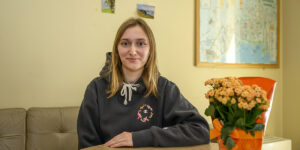
Photography by Eugene McCafferty
She lived in Phoenix House for a long time herself, and knows how hard it is to find an alternative. “I lived here for almost two years, but I found a room in Limerick. It was really difficult to be honest, I was looking for about six months, maybe more. One of my friends suggested a place to me. I’m not a professional interpreter or anything, but I had learned English for some time and when I came to Shannon I realised it was hard for a lot of people here to communicate. I was working and volunteering here to translate. They asked me to come a;pmg today to help. It’s really devastating. Every time you move it gets harder and harder. A lot of people here are good people, they’re trying to do their best, they try to find a job, find accommodation and start a new life. They are really grateful to the Irish people and Ireland in general. They want to do their best, but it’s hard when every year you are starting your life from scratch.”
Her father is in the Ukrainian military and she is in Ireland on her own.
When a Russian atrocity saw around 100 people killed, Olena Matsak knew it was time to take her ten year old son Matvii and herself to safety. “For me the main turning point was when the grocery store was hit by a missile, and 100 people died. I decided I should go somewhere, and came here to Ireland. I felt it was the right decision, it could be me the next time.”
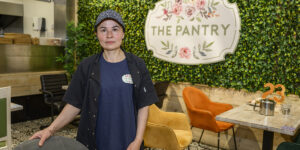
Photography by Eugene McCafferty
Adapting to life in Ireland was not very easy, but they have made progress and she is concerned that Matvii could slip backwards. “It was a really difficult and hard journey. I started to work in The Pantry and started to learn English. I’m really worried about Matvii, he has started to go to school, he’s started to work with a psychologist here. He is doing music, going to Tae Kwando, he wanted to join the basketball team, he was trying to adapt here.”
She has been looking for new accommodation for months, but it is very hard with a severe housing crisis. “I’m looking for a place to rent, all of the people I’m working with are trying to help us find accommodation, but we’ve had no luck. I’ve been looking for a long time, it’s not like I just started two weeks ago, I’ve been looking for more than six months.”
She is looking at having to raise her son in a communal room. “We are to go to the hostel. In the hostel there are rooms for eight people. To live together with six other people would be very difficult.”
Moving to Lisdoonvarna could be very damaging, she fears. “The Government wants us to integrate, to find jobs, to have occupations. But if we move to Lisdoonvarna we’ll be on social welfare, we’ll lose our jobs and be depending on that. I’m afraid to lose my job, it’s a big step back if I do. We are told there is one school there and it’s full already. Will we find new work? It took a long time to find a job here.”
Owen Ryan has been a journalist with the Clare Champion since 2007, having previously worked with a number of other publications in Limerick, Cork and Galway. His first book will be published in December 2024.

